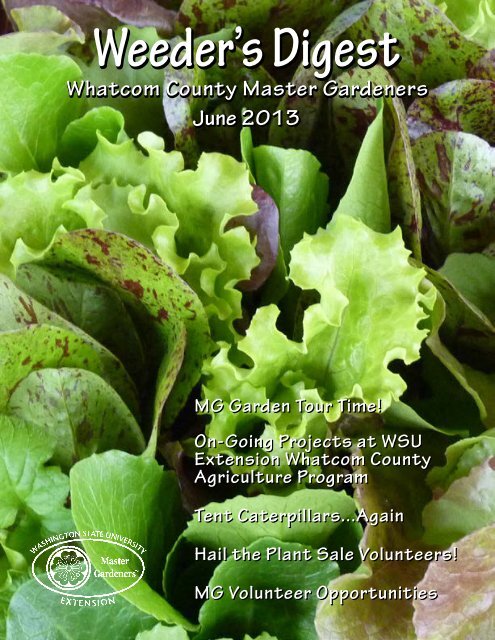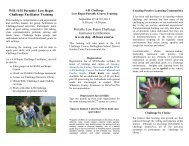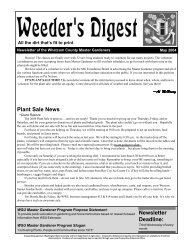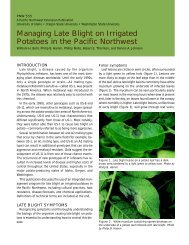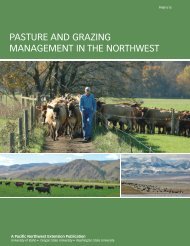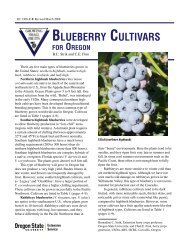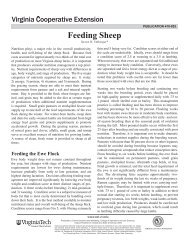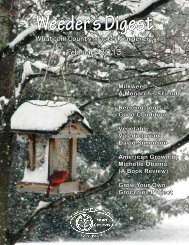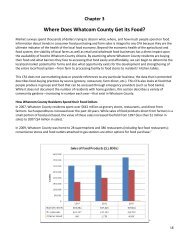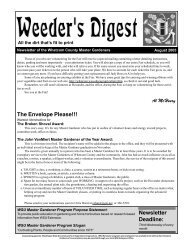June 2013 - WSU Whatcom County Extension - Washington State ...
June 2013 - WSU Whatcom County Extension - Washington State ...
June 2013 - WSU Whatcom County Extension - Washington State ...
- No tags were found...
You also want an ePaper? Increase the reach of your titles
YUMPU automatically turns print PDFs into web optimized ePapers that Google loves.
Weeder’s Digest<strong>Whatcom</strong> <strong>County</strong> Master Gardeners<strong>June</strong> <strong>2013</strong>MG Garden Tour Time!On-Going Projects at <strong>WSU</strong><strong>Extension</strong> <strong>Whatcom</strong> <strong>County</strong>Agriculture ProgramTent Caterpillars...AgainHail the Plant Sale Volunteers!MG Volunteer Opportunities
Master GardenerProject Updates...Interns in the new class of Master Gardeners have becomeinvolved in some pretty interesting projects. Here are afew of them - more to come in upcoming issues of theWeeder’s Digest.Mill Shires and Barney Fleming are working with a groupof members of the Max Higbee Center in their CommunityAccess Program, planting and maintaining theirvegetable plot at the City of Bellingham Lakeway Garden.Participants in the program are involved in a cooking classin which they are growing their own food.Linda Versage has been assisting Windward High School’sHorticulture class. They have a school garden and will begrowing some variety trials of beans for a <strong>WSU</strong> researchproject.Rebekah Snodgrass, Linda Versage, and Julie Turner havebecome mentors in the Bellingham Food Bank GardenProject in which they are providing support and gentleconstructive guidance to garden recipients. Mentorsmeet at the gardener’s home approximately once a weekto provide organic gardening information and resources.In this same program, Shannon Allegra Fox and AlliePasquier are contributing as writers and photographers tothe Garden Beet, which is the Garden Project’s monthlynewsletter. Check out their first issue soon at http://www.bellinghamfoodbank.org/our_programs/garden_project.Interns are also participating in Master Gardeners at theBellingham Farmer’s Market. MGs have a booth everysecond Saturday throughout the season. The topic for<strong>June</strong> 8 will be All Things Composting. This team consistsof Alex Burrows, Alex DuPont, Cathy Steele, Meilani Obra,Linda Versage, Shannon Allegra, and Frank Hubka.Interns were a huge help at the Annual Plant Sale! Theyparticipated in potting plants, setting up for the sale,assisting customers at the sale and sticking around to helpput everything away after the sale. They contributed inlarge part to the success of this year’s sale.And let’s not forget the enormous help of the internsin the Master Gardener Clinic during the summer andbeyond. Interns volunteer for at least 20 hours each aspart of their requirement to graduate from the MasterGardener program.Stay tuned for more project descriptions next month...<strong>Whatcom</strong> <strong>County</strong> Master Gardeners Program1000 N. Forest StreetSuite 201Bellingham, WA 98225-5594360-676-6736http://whatcom.wsu.edu/mastergardener/MISSION: The <strong>WSU</strong> <strong>Extension</strong> Master Gardeners Programtrains volunteers to be effective community educators ingardening and environmental stewardship.<strong>WSU</strong> WHATCOM COUNTY EXTENSION STAFF:Drew Betz: <strong>County</strong> DirectorChris Benedict: Agriculture EducatorColleen Burrows: Agriculture Special Projects CoordinatorBeth Chisholm: Master Gardeners & Community FirstGardens ProjectCheryl Kahle: Office Manager<strong>Whatcom</strong> <strong>County</strong> Master Gardener FoundationROLE: The Master Gardener Foundation of <strong>Whatcom</strong> <strong>County</strong>supports the MG program with fundraising and providesinformation about home horticulture to the public through ademonstration garden, lectures and home gardening advice.MG FOUNDATION BOARD:Past President: Loretta HoggPresident: Sandy Keathley1st Vice President: Louise Granger2nd Vice President: Chris HurstSecretary: Kay ReddellTreasurer: Pat EdwardsMembers at Large: Linda Battle & Kathleen BanderRepresentative to <strong>State</strong> Foundation: Linda BergquistThe Weeder’s Digest is the monthly newsletter of the<strong>Whatcom</strong> <strong>County</strong> Master Gardeners Program. Guest articlesare encouraged. Please submit to Jo Fleming (jof@uw.edu).Articles are most appreciated if they contain 600 or fewerwords and are accompanied by a photo. Editors reserve theright to edit for content and formatting.cooperating agencies: <strong>Washington</strong> <strong>State</strong> University and U.S.Department of Agriculture. <strong>Extension</strong> programs and employment areavailable to all without discrimination. Evidence of noncompliancemay be reported through your local <strong>Extension</strong> Office.Cover photo - Lettuce Bowl - by Jo Fleming, MG 2012
All the Latest MG& FoundationNews!Master GardenerFoundation NotesHere’s to another great plant sale! And I think thisyear’s was especially great, thanks to a LOT Of people:Alden Seivers for his detailed organization of the setupand breakdown, Linda Berquist and Alicia Lanz forrecruiting Master Gardeners, Judy and Jack Boxx foronce again helping everywhere they were needed,Dennis Connors from Hovander Park for preparingthe park and coordinating the traffic flow, and last butcertainly not least, Loretta Hogg for heading up theplant sale and keeping us all going in the right direction!Also thanks to the loyal crews at the greenhouses andeveryone who supplied plants! A really big differencethis year were all the Master Gardeners who set upduring the week, worked the sale and then stayed tothe end to clean up. Everything went so smoothly andI think we may have set some time records this year.So thanks to EVERYONE! We couldn’t have done itwithout you!MG Foundation<strong>June</strong> Meeting<strong>WSU</strong> <strong>Whatcom</strong> Master Gardener FoundationMeeting Thursday, <strong>June</strong> 13, <strong>2013</strong> at 6:00 pmMaster Gardener Garden Tour. Tour threegardens in the Birch Point area. Tour begins at6:00pm. Open to all Master Gardeners and thepublic. (Please see invitation on the next pagefor more information and directions.)This garden tour takes the place of the monthlymeeting.Sandy Keathley, MGF PresidentVolunteer Job AnnouncementSummer/fall <strong>WSU</strong> Community First Garden program assistant.• Help plan our 3rd annual Community First Garden Learning and Networking Fair.• Help plan the Sept 14th Community Garden Tour in connection with SustainableConnections Farm Tour and EVERYBODY Bike.• Assist our local garden partners with networking, by updating and improving our website materials.• Follow up with Community First Garden members who are looking to host workshops or work parties attheir gardens.• Attend regular Steering Committee meetings with the Community First Garden Project members.Description: Ideally this would be someone who has a keen interest in improving accessibility and awareness ofthe value of community gardens throughout <strong>Whatcom</strong> <strong>County</strong>. This position would be a weekly commitment of4-5 hrs per week, working at the <strong>Extension</strong> office or from home, helping Beth Chisholm with email, phone andsite visits, and working with our local partners. Contact Beth at beth.chisholm@wsu.edu • (360) 676-6736.
MG Calendar - <strong>June</strong> <strong>2013</strong><strong>June</strong> 1Saturday<strong>June</strong> 1Saturday<strong>June</strong> 2Sunday<strong>June</strong> 6Thursday<strong>June</strong> 8Saturday<strong>June</strong> 13Thursday<strong>June</strong> 16Sunday<strong>June</strong> 20-21Thurs/Friday<strong>June</strong> 20Thursday<strong>June</strong> 27Thursday<strong>June</strong> 30SundayRain Garden Tour deBellinghamWatershed-FriendlyProject ExpoGrowing Vegetables inSmall SpacesMG Foundation BoardMeetingMGs at the BellinghamFarmer’s Market -All Things CompostingMG Foundation GeneralMeeting - Garden TourSmart Watering for YourGardenMG <strong>State</strong> CoordinatorsMeetingDig into Reading withthe Master Gardeners -Family ActivityMay Monthly PlantStudy GroupGood Bugs, Bad BugsBloedel Donavan Park, 9:30am-12:30pm. An expert-guided tour ofBellingham’s rain gardens.Bloedel Donavan Park, 1:00pm-3:00pm. Connect with experts and seesamples of watershed-friendly mulches, native plants, permeable concrete,and rainwater tanks.Hovander Homestead Park, 2:00pm. Janet Bieber presents how to raise yourfavorite vegetables and fruits in containers or small spaces.<strong>WSU</strong> <strong>Whatcom</strong> <strong>County</strong> <strong>Extension</strong> Office, 10:00am-12:00pmMGs will have a booth at the market every second Saturday throughoutthe season. Downtown, Depot Market Square, 1100 Railroad Avenue,Bellingham, 10:00am to 3:00pm. Topic is All Things Composting.Master Gardener Garden Tour. Tour three gardens in the Birch Point area.Tour begins at 6:00pm. Open to all Master Gardeners and the public. (Pleasesee invitation below for more information and directions.)Hovander Homestead Park, 2:00pm. David Simonson demonstrates how towater the right place, the right amount, and the right way.Master Gardener Coordinators Meeting in Ellensburg. Beth Chisholm isattending this statewide meeting of MG coordinators.Bellingham Central Library, Lecture Room, 1:00pm-3:00pm. Storytime forPre-K children featuring “The Enormous Turnip” as told by MG Harriet Arkely(1:00-1:30). All-ages gardening Q&A for any questions about plants andgardening (1:45-3:00).Cordata Food Cooperative (upstairs meeting room), 9:00am-11:00am.Contact Karen Gilliam for more information, kgilliam@gmail.com.Hovander Homestead Park, 2:00pm. Laurita Whitford discusses the bugs thatlive in your garden and how to manage them wisely.You Are Invited - MG Garden Tour Time!<strong>June</strong> 13 is the first Garden Tour. We will tour three gardens in the Birch Point area instead of having our regular MGFoundation meeting. The tour begins at 6:00 p.m.The first stop will be a lovely Japanese Garden surrounding the home of Barbara and Richard Skudlarick. As you walkup the drive, you will enjoy the many Japanese maples and the Rhododendrons. You approach the front door througha red gate and walk through the courtyard which has a pond, gong and lovely plantings. Follow the path to the rightof the house to enjoy the stone lined creek and discover the many Japanese maples and High Mountain Hemlock.The hemlocks were individually picked and dug from high on the mountains when the owners accompanied a personlicensed to dig these gorgeous trees. The tortured shapes are something to behold.Your next stop is the home of Gary and Bonnie Anderson. These California transplants have taken to “country life “ andfilled their 5 acre lot with many horticultural endeavors. In the front is a fenced enclosure where they have plantedfruit trees, berry bushes and vegetables. Later, Gary will plant a pumpkin patch next to the fence. While strolling to theback of the property, you can enjoy the tall conifers and plantings surrounding the home. In the back, you can inspectthe raised beds with removable covers that Gary built. He also built a Torii for the Japanese garden they created.The last stop is the home of Master Gardener, Luanne Williams and her husband. Enjoy the view of the bay while yousurvey the plantings in the many flower beds. The microclimates caused by wind, salt water, ground water flow andintense reflected sun dictate the location of different plants in each bed. You will notice Luanne loves hydrangeas sodon’t miss “Hydrangea Allee” on the south side of the house.DIRECTIONS: Take I-5 North to exit 270 (Birch Bay Lynden Road). Go west (left) for about 4 miles to the Waterslidecorner. Turn left, down the hill then right. Go about 4 miles then look for the open gate. You can park there to see thisgarden then drive .2 miles north to Luanne’s house and park on that street. Walk across the road to Anderson’s to viewtheir property. End the evening at Luanne’s house.by Luanne Williams
On-Going Projects at <strong>WSU</strong><strong>Extension</strong> <strong>Whatcom</strong> <strong>County</strong>Agriculture ProgrambyChris Benedict<strong>WSU</strong> <strong>Whatcom</strong> <strong>County</strong> <strong>Extension</strong>I was asked to pull together a brief article on the current projects that we are working on in the Commercial AgricultureProgram at <strong>WSU</strong> <strong>Extension</strong> <strong>Whatcom</strong> <strong>County</strong>. First, I want to take a second to explain our mission. This program’s goal is tosupport and sustain the commercial agricultural industry in <strong>Whatcom</strong> <strong>County</strong>. To this end we are involved in a number ofprojects that investigate solutions to current issues and also develop avenues to transfer information to commercial producers.I can’t emphasize enough that we do this by accessing extramural funds (public and private funds), work in partnership with anumber of University and industry personnel, and work hand in hand with the diverse set of commercial agriculture producersthat provide food products and manage our working lands in <strong>Whatcom</strong> <strong>County</strong>.Small Fruit IndustryOne of the most economically damaging pressuresthat small fruit growers (particularly red raspberries)face are issues surrounding declines in soil health.These declines result from a number of factors, butresult in increased soil-borne pathogen pressure thatcan dramatically reduce the productivity of plantings.While soil is a complex of physical, chemical, andbiological components, this decline is overwhelmingthe results of imbalances in the biological component.Since 2010 we have been investigating this complexto more accurately understand what factorscontribute to this decline, identify cultural practicesthat can assist with mitigating pathogen pressures,and have worked with a number of researchers andproducers to seek solutions that are economicallycompatible to mitigate these pressures. We will alsobe performing a county-wide survey of the presence of Verticillium dahliae (a soil-borne pathogen that has a wide host rangeand has not historically been identified as a major causal agent in decline issues) in red raspberries.As many of you know, one of themost economically importantdirect arthropod pests for the smallfruit industry is Spotted WingedDrosophila that can reduce yieldand yield quality. While this is arecent pest, if one looks at thehistory of the small fruit industryhere in <strong>Whatcom</strong> <strong>County</strong>, itspresence has dramatically alteredthe practices that commercialgrowers undertake. Since itsintroduction into the <strong>County</strong>, wehave been involved in developing monitoring strategies that can improve management tactics.
Birds are a major issue in crops grown in <strong>Whatcom</strong><strong>County</strong> and <strong>Washington</strong> <strong>State</strong> such as cherries, grapes,and Honeycrisp apples. A new project has been designedto address bird damage to blueberries, cherries, winegrapes, and Honeycrisp apples utilizing a systemsapproach. Research is being performed in <strong>Washington</strong>,Michigan, and New York states to compare environmentsand growing systems. The long-term goal is to provideproducers with cost-effective, environmentallysustainable bird management strategies.Seed Potato Industry<strong>Whatcom</strong> <strong>County</strong> houses the largest seed potato industry in thestate. As <strong>Washington</strong> is a major producer of potatoes, both for freshand processed consumption, the vitality of the seed potato industryis important for many thousands of acres found throughout the stateand region. As potatoes are asexually propagated, it is imperativefor this industry to maintain strict sanitation standards to ensure thatthe products they sell are free of plant pathogens. One economicallyimportant pathogen is Potato Virus Y (PVY). This virus is transmitted/disseminated through aphids in space, but transferred through timeby the asexual propagation process. Beginning in 2012, we have beenquantifying the distribution of this virus, but have also been monitoringthe various strains of PVY that are present in seed lots. Just to giveyou an idea of the laborious nature of doing such a survey, in 2012 wewalked a combined 130 miles in potato fields looking for the presence ofthis virus. The end result of this work will lead to improved managementtactics for commercial seed potato producers.Scouting a potato field forsympotomatic plantsDairy IndustryThe dairy industry has a large footprint in <strong>Whatcom</strong> <strong>County</strong>, and plays astrong role in crop rotation with other agriculture industries. Whiledairy production has many facets associated with production,A PVY sympotmatic plantanimals need to be fed high quality feedstocks to maintain their productivity. One of the highest costs associatedwith <strong>Whatcom</strong> <strong>County</strong> dairy production is feed costs. <strong>Whatcom</strong> <strong>County</strong> is the second largest silage corn producerin the state; all of which is consumed locally by the dairy industry. A key component to maintaining productivity isto identify varieties that are productive in our cool maritime climate. Beginning in the spring of 2012, we have beenevaluating a number of commercially available silage corn varieties that can help to increase yields and yield quality,thus reducing production costs for our dairy industry.Short season silage corn variety trial
Diversified Direct-Market Vegetable IndustryFor many people in <strong>Whatcom</strong> <strong>County</strong>, the “face” of the agriculture industry is present during the exchange of goods at thefarmers market in Bellingham/Fairhaven, through a CSA share, or through purchases at the local supermarkets/Co-ops. Theseproducers commonly grow a number of different products (mainly vegetables) that are sold and consumed directly fromproducer to consumer. These producers are commonly small in scale (< 25 Acres) and raise a number of different crops tomeet consumer demand. We have a number of different projects ongoing that support this industry; I’ll give a brief overviewof them.Beginning in the fall of 2012 in collaboration withCloud Mountain Farm Center and <strong>WSU</strong> Mt. Vernon,we initiated a screening of commercially availableleafy green types/varieties. This project is attemptingto identify types/varieties that perform well duringthe “shoulder-season” (Early Spring & Late Fall). Inaddition to improving profitability, we are evaluatinga set of tools to mechanize the process. In the endwe hope to increase the availability of healthy, locallyproduced products.Since 2009, we have been part of an integrated team working to evaluate an organically approved reduced tillage system forvegetable growers in the Pacific Maritime Northwest. This production system relies on identifying cover crops that can bemechanically terminated using a variety of tools. Below are some photos of the tools we utilize to terminate the cover cropto improve soil health and suppress weeds. Throughout the course of this project we have evaluated over 20 different covercrop types/varieties to see if they can be terminated utilizing reduced tillage equipment in a timely manner.The 2012 reduced tillage trial at <strong>WSU</strong> NWREC - 15 cover crop types/varieties were included in this trial.A roller/crimper that crushes the vascularsystem of the cover, creating a mulchlayer to suppress weeds.A strip tiller that cuts through the terminatedcover crop, creating an area where the cashcrop can be planted.I probably have missed some projects we are working on, but there are always ample opportunities to hear about ongoingwork and the results from these projects by checking out our newsletter <strong>Whatcom</strong> Ag Monthly (http://whatcom.wsu.edu/ag/newsletter.html). We have had many MG volunteers participate in our projects doing various fieldwork, so if you areinterested, let me know!
TentCaterpillarsAgainBy now, tents and the orange caterpillars should bevisible. Huge outbreaks were reported from WhidbeyIsland, San Juan Island and in Clallam <strong>County</strong> in 2012.Expect them to be abundant in new areas this year.Prune out nests (do not burn) or when caterpillars formmasses on the tree trunk, the underlying silk can be pulledoff along with the caterpillars which will cling to the silk.More details at http://snohomish.wsu.edu (search fortent caterpillar) or for controls check Hortsense or PNWInsect Management Handbook, Common LandscapePests.from Bugs & Blights, Sharon J. Collman, <strong>WSU</strong> Snohomish<strong>County</strong> <strong>Extension</strong>You know that feeling you get when you make a difference to someone? I had that thismorning! My neighbor was freaked out by all the “web worms” on his trees. I looked atthem and told him these were not fall web worms, but were Western Tent Caterpillars. Itold him they come from a grayish/brown moth with some dark patterning, unlike thewebworm which comes from a white moth.He was concerned they were going to kill his trees. I reassured him and explained thatwhile defoliated, the branches or limbs had a good chance of recovery next spring and thatit was unlikely to kill his trees except for very young heavily infested trees. He was going tospray his trees, but I suggested he wait till evening, then just cut out the nest section of thebranch and put it in a bag in the trash.He was grateful and impressed and wondered how I knew this. I told him because I wastaking classes and studying to become a Master Gardener, and I learned about these from<strong>WSU</strong> <strong>Extension</strong>.It made my day!Thanks!Mill (Millard Shires, MG <strong>2013</strong>)
Hail the Plant Sale Volunteers!by Kathleen BanderMonths of work every year are spent preparing for the yearly (and only) fundraiser for the <strong>Whatcom</strong> <strong>County</strong> MasterGardener Foundation. It’s the Plant Sale, this year held at Hovander Park on May 11.Every year there are constraints and every year there are challenges. This year was noexception. But every year there are hale and hearty Master Gardener and partners ofMaster Gardener volunteers who work long and hard to ensure a profitable outcome.This year we’re proud to announce that round about $11,500 was raised.The money raised pays the salary of the Master Gardener Coordinator and helps supportmany varied programs.This year, two sale veterans headed up the planning and preparation—Loretta Hogg andAlden Sievers. Together with their leadership, and many Master Gardener volunteers,the work took only half the time it has in years past.Set-up this year wentsmoothly, with onemajor exception, that ofan injured knee for AliciaLinda Bergquist & David SimonsonLanz. She had to miss thesale itself, which was a shame as she had worked so hard lining up volunteers.Loretta HoggInnovations this year include accepting credit cards for the firsttime. Common wisdom says card use increases sales. It certainlymakes it easier for people to make their purchases. Good weatherplayed a part in thesuccess, no doubt, asdid the sale of veggiestarts and lettuce bowls,which proved to be verypopular.As Linda Bergquist, a Master Gardner who has seen many sales, puts it: “It isalways so obvious to me how much my fellow MGs like being together.” Anyoneat the sale knows that without Linda, there wouldn’t be nearly the humor andfun, as well as the expertise she provides.Alicia LanzAn issue that is becoming important to veteran Master Gardeners is that ofsuccession. For example, who will take over the running of the 2014 Plant Sale? For several years, Alden Sievers hasmasterfully orchestrated the show, but he’s stepping down from the post.The answer was clearly seen during the sale. Following Aldenaround, making notes of everything that was going on, was SandyKeathley, who has tentatively agreed to do the job next year. Shesays she’ll bring someone along to train as her successor, as well.It’s good to know the sale will be in good, experienced hands.Sandy Keathley & Alden SieversOne thing is clear. Change is inevitable. It keeps things fresh, itkeeps things moving. So if you have any great ideas for next year’ssale, or want to help out in any way, just contact Sandy. (She’sserving this year as President of the MG Foundation Board). Andif you have any hesitation about helping, consider this. At the endof the sale, when everyone is tired but the break-down has to befinished, no grumbling ever occurs. Everyone just works until thejob is done. New MGs and Veteran MGs work side by side, and takepride in a job well done!
AndMoreThanks!THANK YOU !Thanks to all our fellow Master Gardeners who helped withour plant sale! We had a successful sale, the weather wasperfect and it was fun to see so many veterans. This year’sclass of interns was very well represented too! The spirit offun and “let’s get it done”made the tasks much easier. Thanksto that spirit all tasks were done quickly and we finished early.THANKS AGAIN!Loretta Hogg & Linda BergquistWOW!!!! What a great group of Plant Sale volunteers you are!Your work moving materials to the site on Tuesday, marking theground on Wednesday, setting-up on Thursday and Friday, anddismantling the sale area on Saturday was phenomenal. Yourwillingness to get the job done made the task so easy -- especiallycompared to previous years. We did most of the work this yearin half the time it normally takes us. So, many thanks to you formaking this year’s Plant Sale extra fun. There is only one problemfor me now -- I forgot how many of you I promised a beer to.Thanks again, and cheers, Alden.PS. I think there are some set-up/take-down volunteers (like TJ,Julie Turner, Bill Mirand, and maybe others) for whom I do nothave an email address. If you know of any, please pass my thankson to them for me.Alden Sievers
Volunteer OpportunitiesNorthwest Youth Services NWYS: WE GROW GardenBackground: We Grow is a seed-to-market education and employmentpreparedness program that provides opportunities to get hands-onexperience working as part of a team in planting, growing, and harvestingfood to bring to our local youth-run market stand and partneringrestaurants. Youth participants work with staff and community volunteersto gain experience in all aspects of bringing food to market, includingharvesting, prepping, marketing and sales of the produce. NWYS clientswork in the garden on a weekly shift. They receive a stipend for that work.<strong>WSU</strong> <strong>Extension</strong> will team up to provide a mutually beneficial partnershipin programming. <strong>WSU</strong> will have the opportunity to use the We Growgarden as a demonstration site for teaching gardening practices to thecommunity through their Community Horticulture programs.The role of <strong>WSU</strong> <strong>Whatcom</strong> <strong>County</strong> Ext. at We Grow: Our primary role is to provide leadership to NWYS clients, providingweekly lessons and guiding the youth with garden management. This is a seasonal commitment to teach and facilitate theNWYS clients. <strong>WSU</strong> <strong>Extension</strong> will offer NWYS clients science-based horticulture practices and opportunities that will assistin building work experience for the youth.Volunteer opportunity EVERY TUESDAY, 1:00pm-4:00pm - help teach and empower youth in our community.Homeschool Garden Visit<strong>June</strong> 7th, 1:00pm-3:00pm. Volunteers needed to work with kids ages 5-12 year.Where: WE GROW garden, Northwest Youth Services.If you are interested contact Beth Chisholm for more information, beth.chisholm@wsu.edu • (360) 676-6736. She plansto lead the lesson but if someone else wants to, that is always an option!!<strong>WSU</strong> Community First Garden Project ForumA date in <strong>June</strong> to be decided. Volunteers needed to help plan this event. Where: Roeder Home.This event will bring together all <strong>Whatcom</strong> <strong>County</strong> Community gardeners and other partners and supporters (BellinghamFood Bank, etc.). The date is yet to be set, but Beth Chisholm is looking for help with such activities as planning food,invitations, logistics at Roeder Home, PR, etc. Please contact Beth if you would like to join this committee,beth.chisholm@wsu.edu • (360) 676-6736.Roeder Home Plant Restoration ProjectEvery other Tuesday during the summer, 1:00pm-4:00pm. Where: Roeder Home.Last summer, a group of MG interns (MG 2012) initiated a project to restore some of the landscape plants at the RoederHome. The initial group consisted of Shelley Fishwild, Linda Battle, Susan Ediger-Blum, Charly Moore, Tina Mirabile, KenSalzman and Stephanie Salzman. They are continuing their efforts and are looking for new volunteers to help with weeding,planting annuals in front of the sign, pruning boxwoods and other shrubs, and sawing out trees that the birds and squirrelsplanted. Oh, we also need to spread more mulch.We need you to bring tools if you can. Our heritage roses have started to bloom and need a little attention as well. TheRoeder Home and Garden are located at 2600 Sunset Drive. If you just wish to come by and check on our progress and giveus some advice, we welcome you as well! We have fun pruning!Spring Creek Dementia Care Garden ProjectLocated near Bellis Fair, http://retirementperfected.com/communities/springcreek/directions.asp.In February they began planting seeds indoors, as part of the horticulture program. We’re ready to begin planting ourcherry tomato, pea and kale so the residents can pick and eat as they walk along the path in the sunshine. Some of theresidents have been raking, helping clear the debris from the Winter, and we’re ready to begin in earnest.What would be fantastic is some help in starting a worm bin, and simple composting that the residents can help with. I’malso at a loss as to a plan for the area. We’d like to begin a square foot garden with trellis, but it needs to be raised andwe would like to have more plants.Are there any Master Gardeners who would donate their time and expertise to help our program in the making?appreciate your consideration. Please call 305-7717 if you need any more information.We


